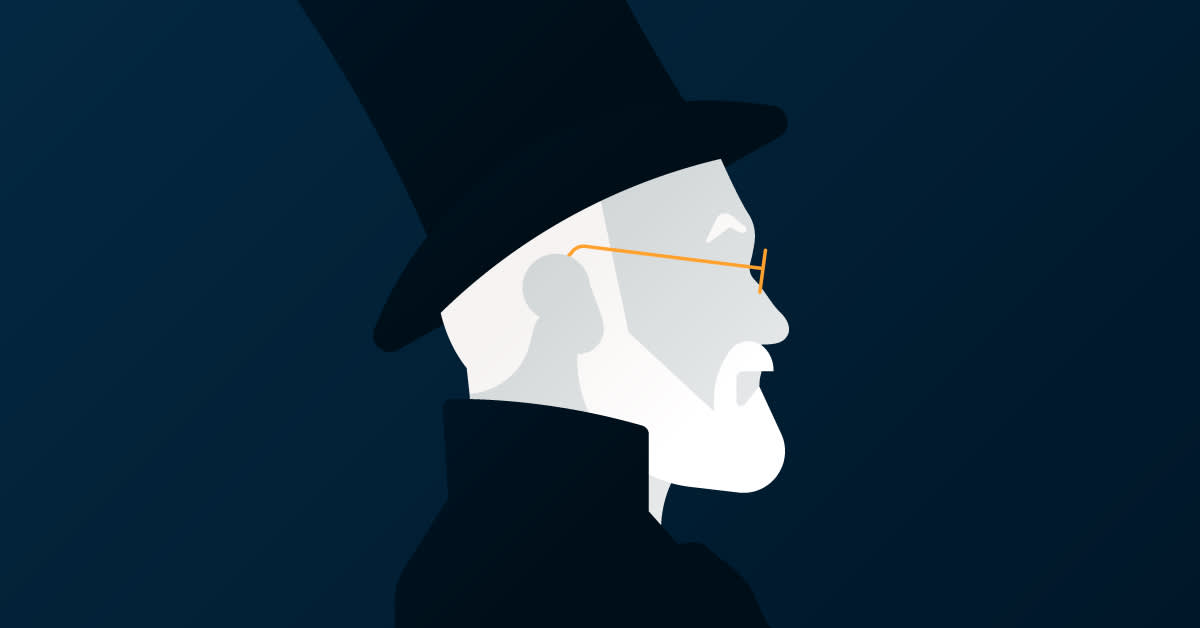There are few characters as dastardly and sinister as Arthur Conan Doyle’s James Moriarty. When we think of cunning detectives, we think of Sherlock Holmes. And when we think of evil masterminds, it's Moriarty all the way. Professor James Moriarty is the only villain sharp enough to outwit the greatest detective of all time—even Holmes himself refers to Moriarty as "the Napoleon of Crime." But who is Professor James Moriarty? And how did he earn the moniker of Sherlock Holmes's arch nemesis?
Who is Professor James Moriarty?
Sir Arthur Conan Doyle introduced readers to Moriarty in the Sherlock Holmes short story "The Final Problem," which was first published in The Strand Magazine in 1893. In creating the ultimate criminal foil for his master detective, Doyle was inspired by a very real criminal. Adam Worth was a master thief who also lived as a member of high society in London around the time Doyle was writing Sherlock Holmes. In The Valley of Fear, the fourth and final Sherlock Holmes novel, Holmes compares Moriarty to another real-life criminal, Jonathan Wild.
Moriarty is described as tall, thin, and pale with deep, sunken eyes and a slouchy rounded-out back from leaning over books and papers for study. What he lacks in strength of body, he more than makes up for in strength of mind. Rather than actively committing crimes, Moriarty is the type of character who remains in the shadows, carefully orchestrating master crimes from behind the scenes. In The Valley of Fear, Doyle described Moriarty as "the greatest schemer of all time."
In envisioning Moriarty, Sir Arthur Conan Doyle intended to create a character who was intelligent enough to kill Sherlock Holmes. Moriarty had to be more than just evil—he had to be shrewd, and he had to be mysterious, even to the world's most observant sleuth. As Moriarty's character developed past his initial introduction in "The Final Problem," readers got more details about the villain's motivations and backstory. After that, Holmes and Moriarty's relationship grows even more complicated. Yet Holmes and Moriarty both know they've met their match in each other—and with that comes a mutual respect, despite their opposing desires and beliefs.
According to Doyle's canon, Moriarty was a renowned mathematician before becoming a criminal mastermind. The professor first rose to prominence in his field when he wrote "a treatise upon the Binomial Theorem." While the contents of this treatise are never divulged in Doyle's works, it did land a young Moriarty a role as the Mathematical Chair at a small but famed university in the UK. But the academic world wasn't enough for someone as ambitious as James Moriarty, and his thirst for power led him to criminal pursuits. When rumors started to spread around campus about Moriarty's wrongdoings, he resigned and moved to London.
Sherlock Holmes and Moriarty first cross paths when Holmes starts looking into Moriarty's organized crime activities. Holmes was able to expose members of Moriarty's gang in high-ranking positions. After many of Moriarty's diabolical plans are foiled by the great detective, Moriarty targets Holmes, even confronting the investigator directly and threatening to kill him if he does not cease his investigations.
Of course, Holmes ignores Moriarty's threats. After turning over information to the police, Sherlock Holmes flees to Switzerland with his partner, Dr. Watson. But Moriarty follows the two men, leading to a fatal confrontation between Moriarty and Holmes at the top of a cliff. This was meant to be the end for Sherlock Holmes, but Sir Arthur Conan Doyle would return to both Holmes and Moriarty in later works. And of course, these characters continue to be revisited in adaptations and reimaginations. No matter what, in every world where there is a Sherlock Holmes, there is a Professor Moriarty.
Who are Professor James Moriarty's allies and rivals?
Sherlock Holmes: Despite the fact that Professor James Moriarty and Sherlock Holmes are mortal enemies, the detective and the criminal mastermind have a deep respect for each other. Both Holmes and Moriarty recognize and admire the other's intelligence and cunning, both seek the other's undoing, and both understand that they hold the power to destroy one another.
Dr. John Watson: Dr. John Watson never meets Moriarty in person and only hears of his actions and words through Holmes's telling of events. It's unclear how much the doctor knows about Professor Moriarty. When Holmes first mentions Moriarty in "The Final Problem," Watson seems clueless about the criminal mastermind. However, in The Valley of Fear, which was published later but predates "The Final Problem" in the Sherlock Holmes timeline, Watson seems to know of Moriarty and his nefarious activities.
Sebastian Moran: Sebastian Moran is one of the criminals in Moriarty's employ. According to Sherlock Holmes, Moran is "the second most dangerous man in London." second only to (of course) Moriarty himself. An army veteran, Moran is skilled with rifles and mostly works for Moriarty as an assassin.
Colonel James Moriarty: Does Moriarty have one sibling or two? And what are their names? Depending on what story you read, you might find differing information about Moriarty and his family. Before Moriarty was given a first name, his brother was called James Moriarty. It is said James Moriarty is a colonel. But in another story, Holmes claims Moriarty has a brother who worked as a station master. But in 1903's "The Adventure of the Empty House," Holmes refers to Moriarty as "Professor James Moriarty." Does Moriarty share the same name with his brother? Does he have two brothers or one with the same job? All of this just adds to the mystery of Moriarty.
Quotes About Professor James Moriarty
“He is the Napoleon of crime, Watson. He is the organizer of half that is evil and of nearly all that is undetected in this great city, He is a genius, a philosopher, an abstract thinker. He has a brain of the first order. He sits motionless, like a spider in the center of its web, but that web has a thousand radiations, and he knows well every quiver of each of them. He does little himself. He only plans.” —Sherlock Holmes in "The Final Problem"
"[Moriarty] sits motionless, like a spider in the center of its web, but that web has a thousand radiations, and he knows well every quiver of each of them. He does little himself. He only plans. But his agents are numerous and splendidly organized. Is there a crime to be done, a paper to be abstracted, we will say, a house to be rifled, a man to be removed—the word is passed to the Professor, the matter is organized and carried out. The agent may be caught. In that case money is found for his bail or his defense. But the central power which uses the agent is never caught—never so much as suspected. This was the organization which I deduced, Watson, and which I devoted my whole energy to exposing and breaking up." —Sherlock Homes in "The Final Problem"
"You stand in the way not merely of an individual, but of a mighty organization, the full extent of which you, with all your cleverness, have been unable to realize. You must stand clear, Mr. Holmes, or be trodden underfoot." —Professor Moriarty in "The Final Problem"
"If I were assured of your eventual destruction I would, in the interests of the public, cheerfully accept my own." —Sherlock Holmes to Moriarty in "The Final Problem"
"In calling Moriarty a criminal you are uttering libel in the eyes of the law—and there lies the glory and the wonder of it! The greatest schemer of all time, the organizer of every devilry, the controlling brain of the underworld, a brain which might have made or marred the destiny of nations—that’s the man! But so aloof is he from general suspicion, so immune from criticism, so admirable in his management and self-effacement, that for those very words that you have uttered he could haul you to a court and emerge with your year’s pension as a solatium for his wounded character … That’s the genius, Watson. But if I am spared by lesser men, our day will surely come." —Sherlock Holmes in The Valley of Fear
How was Moriarty reinvented and reimagined for the Audible Originals Moriarty: The Devil’s Game and Moriarty: The Silent Order?
The truth behind Moriarty remains a mystery in many ways. Who is Professor James Moriarty? Where did he come from? What are his true motives? These questions and more are explored in the Audible Originals Moriarty: The Devil's Game and Moriarty: The Silent Order, which reimagine Moriarty as a misunderstood but ultimately innocent man.
Moriarty: The Devils Game stars Dominic Monaghan as Professor James Moriarty, a fugitive framed for murder. He was at the brink of a mathematical breakthrough so powerful it could predict the future when his fiancée, Rose Winslow, was brutally murdered, thrusting the professor into the middle of a murder investigation. Now Moriarty must use his intelligence to solve the murder and prove his own innocence. Hot on his tail are Sherlock Holmes (Phil LaMarr) and Dr. John Watson (Adam Godley). With the help of his cellmate Colonel Sebastian Moran (Billy Boyd), Moriarty will fight to evade his pursuers and solve the crime. But what will it cost him?
Moriarty: The Silent Order finds Monaghan and LaMarr returning as Moriarty and Holmes in a blockbuster new adventure as they face the villainous Lady Milverton, brilliantly portrayed by the incomparable Dame Helen Mirren. The all-star cast’s performances, paired with a meticulously crafted sound design, make for a truly electrifying audio experience. The game is once again afoot when Moriarty: The Silent Order premieres on November 9, 2023.






